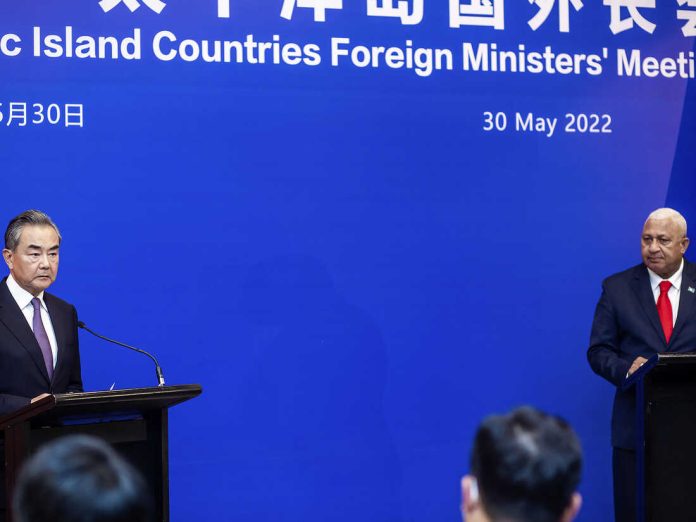China has shelved its plan to sign a regional agreement with Pacific island nations.
Foreign Minister Wang Yi has been travelling to Pacific nations and had planned to visit 10 countries in the two-week blitz.
Wang says China will instead release a position paper following a meeting with Pacific foreign ministers in Fiji on Monday.
“After meeting, China will release its own position paper on our own positions and propositions and cooperation proposals with Pacific island countries,” he said.
“Going forward, we will continue to have ongoing and in-depth discussions and consultations to shape more consensus on cooperation.”
Australia’s Foreign Minister Penny Wong said the decisions in the region needed to be made by Pacific nations
“It’s up to the countries of the region to make choices for their people,” Senator Wong said in a statement.
“The security of the Pacific is the responsibility of the Pacific family, of which Australia is a part, and we want to help build a stronger Pacific family.”
Yang also tried to disparage commentary about China acting nefariously in the region as it tries to increase its influence.
“Don’t be too anxious and don’t be too nervous,” he said.
“The common development and prosperity of China and all the other developing countries would only mean great harmony, greater justice and greater progress of the whole world.”
Senator Wong said Australia would always work alongside Pacific nations on security challenges.
“We want to bring new energy and more resources to the Pacific,” she said.
“We want to make a uniquely Australian contribution including through the culture we share and economic opportunities through our Pacific labour programs and permanent migration.”
Senator Wong visited Fiji following a visit to the Quad Leaders’ Summit in Tokyo.
The wide-ranging deal was leaked last week and covered free trade and security cooperations, including areas such as police training, cyber security, maritime mapping and resource access.
Micronesia expressed opposition to the regional agreement according to a leaked letter, and had previously publicly expressed concern over the Sino-Solomons pact and what it would mean for the region’s security.
An official from Kiribati told Reuters the country wanted to focus on economic ties rather than a security deal.
Wang says China will provide assistance to Pacific Islands without political strings.
Fijian Prime Minister Frank Bainimarama says there remained a “consensus firs” approach to regional agreements following the foreign minister’s meeting.
Viliame Gavoka, the leader of Fiji’s largest opposition party the Social Democratic Liberal Party (SODELPA) said if elected, he would support greater economic collaboration with China, but would strike down any agreements on security or policing.
“Absolutely no. Security for us, SODELPA, is with our traditional allies. We’ve always been a Commonwealth country and our security is with Australia, with NZ, with the United States,” he told SBS News.
China’s ambassador to Fiji, Qian Bo, told reporters after the meeting, the draft communique and five-year plan sent by China to Pacific nations would be shelved until an agreement was reached.
“There has been general support from the 10 countries with which we have diplomatic relations, but of course there are some concerns on some specific issues,” he said.
“We have agreed these two documents will be discussed afterwards.”
Australia and the United States expressed concerns about a Chinese security deal signed with the Solomon Islands and said any military base in the Pacific would be considered a “red line”.
The U.S has also stepped up its footprint in the Pacific, with its embassy in Solomons’ capital Honiara due to reopen.
Regional security and a more assertive China was one of the main focuses of the Quad meeting between the heads of Australia, the US, Japan and India when they met last Tuesday.
SOURCE: SBS/REUTERS/PACNEWS














